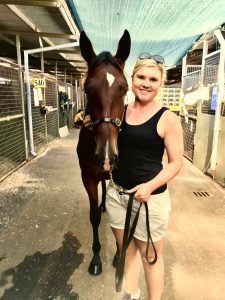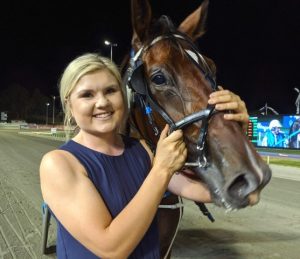Jemma gives her dreams free rein
When Jemma Hayman was a teenager, she and her parents had different ideas about her future.
Jemma dreamed of a life with horses. Her parents had a good education and solid career in mind.
“My uncle owned a standardbred when I was about 14 and that’s how I got the racing bug,” Jemma said.
“I spent a lot of time at the trainer’s stables and started working there at weekends but my parents channeled me to school and university.
“I thought I could combine a passion for racing with care of racehorses, so I went to university to study vet science and kept doing stable work on the side.
“I tried to do it all.”

Her success can be judged by her qualifications as a harness trainer, breeder, owner and trackwork driver as well as veterinary surgeon.
She even made a detour into thoroughbred training and had a strong runner in the 2014 Perth Cup – but standardbreds are her first love.
Her favourite is a mare called Double Expresso, known as Viv around the stables.
The star pacer has twice won filly-of-the-year titles in the WA Harness Awards but her value goes beyond honours and prize money.
“She’s my best friend and every morning she’s waiting for me so we can go out together,” said Jemma.
“She’s a marvel horse.”
While Viv’s home is secure for life, Jemma is enthusiastic about the wider prospects for standardbreds retiring from the track and strongly believes racing is excellent preparation for a range of new careers.
“They are a relaxed, hardy breed and people are realising how good they are to ride,” she said.
“Their stamina makes them a good fit for endurance riding. Middle-aged people who want to get back into riding are choosing standardbreds for trail riding or adult riders because of their calm temperament and they are great for kids, too.
“The routine of racing gives horses an impeccable education. They’ve had a lot of handling and exposure to different environments. They are used to travelling, good for the farrier, lead well and stand tied quietly.
“When they make the change to riding, they take it in their stride.
“As a vet, I see a lot of non-racing horses with bad habits but with former racehorses, the hard work has already been done and the basics are in place.
“It’s important for people to understand that we do what it takes to give horses good homes after racing. I wouldn’t be involved if it was any other way.”

Unsurprisingly, the allure of harness racing for Jemma links back to her impulse to control everything.
“I can do it all myself from breeding and training to dietary management and monitoring soundness,” she said.
“The sport is attainable and affordable in all aspects, which is more difficult with thoroughbred racing.
“My day starts at 6am and ends at 9pm but I love the balance between training, racing and being a vet. And I love the horses.”

